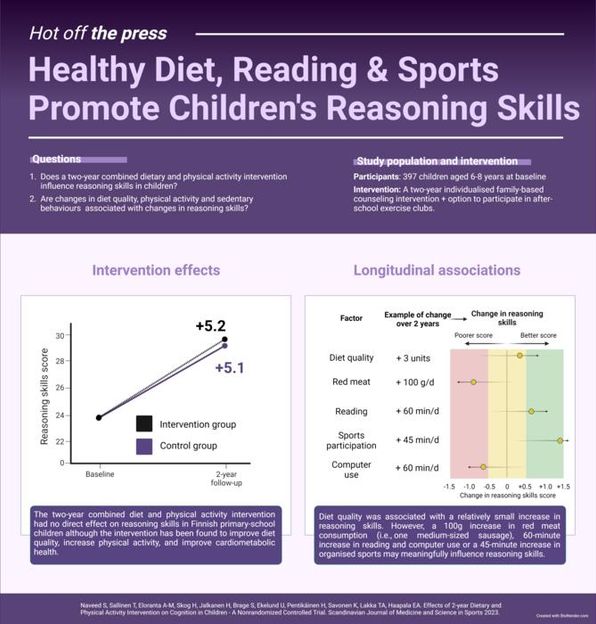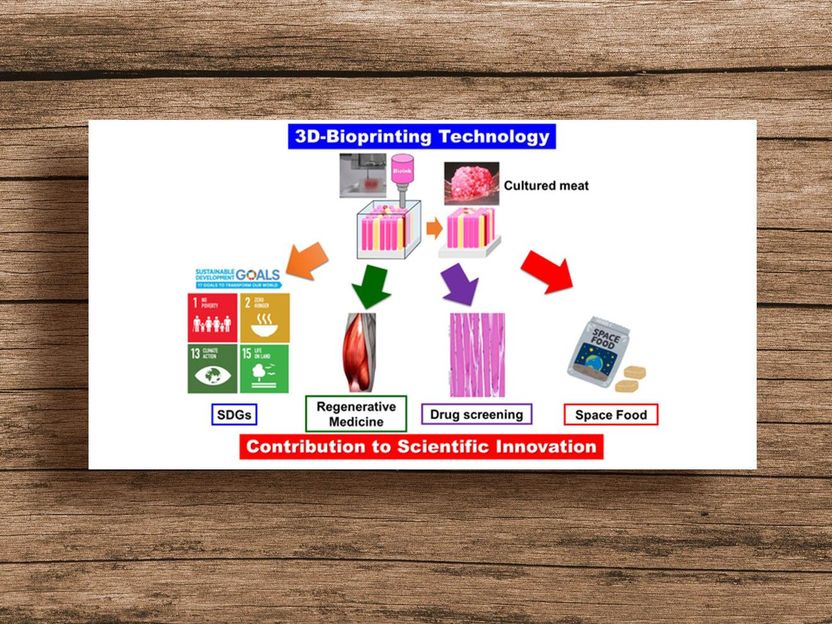A healthy diet, reading, and doing sports promote reasoning skills in children
Reasoning skills are crucial skills in learning, academic performance, and everyday problem-solving. According to a recent study conducted at the University of Eastern Finland, improved overall diet quality and reduced consumption of red meat, as well as increased time spent in reading and organised sports enhanced reasoning skills among children over the first two school years.

Healthy diet, reading and sports promote children's reasoning skills.
Eero Haapala
“Children with healthier eating habits showed greater cognitive development than other children. Specifically, better overall diet quality, lower red meat consumption, and higher low-fat dairy product intake were linked to better reasoning skills,” says Doctoral Researcher Sehrish Naveed of the University of Eastern Finland.
Children who spent more time in reading and organised sports showed better reasoning skills than their peers. On the other hand, excessive time spent on a computer and unsupervised leisure-time physical activity were associated with poorer reasoning skills. Screen time, active school transportation, recess physical activity, and physical activity intensity were not associated with reasoning skills.
Over half of the children participated in a two-year family-based and individualised diet and physical activity intervention. However, the intervention did not impact reasoning skills, with the children in the intervention and control groups exhibiting similar cognitive development.
“In the lives of growing children, diet and physical activity intervention is just one factor influencing lifestyle and reasoning skills. Based on our study, investing in a healthy diet and encouraging children to read are beneficial for the development of reasoning skills among children. Additionally, engaging in organised sports appears to support reasoning skills”, Dr Eero Haapala points out.
Published in the esteemed Scandinavian Journal of Medicine & Science in Sports, the results of this study are based on data from the Physical Activity and Nutrition in Children (PANIC) study. This sub-study examined the effects of a two-year diet and physical activity intervention on cognition among 397 Finnish elementary school children. The associations of dietary factors, physical activity, and sedentary behaviour with cognition over two years were also studied. The analyses considered parental education and income as well as children’s body fat percentage and maturity level.
Original publication
Most read news
Other news from the department science

Get the food & beverage industry in your inbox
By submitting this form you agree that LUMITOS AG will send you the newsletter(s) selected above by email. Your data will not be passed on to third parties. Your data will be stored and processed in accordance with our data protection regulations. LUMITOS may contact you by email for the purpose of advertising or market and opinion surveys. You can revoke your consent at any time without giving reasons to LUMITOS AG, Ernst-Augustin-Str. 2, 12489 Berlin, Germany or by e-mail at revoke@lumitos.com with effect for the future. In addition, each email contains a link to unsubscribe from the corresponding newsletter.
Most read news
More news from our other portals
Last viewed contents

PureCircle and U.S. Customs and Border Protection Resolve 2014 Stevia Sourcing

Cargill survey reveals nearly all Americans indulge in a daily chocolate treat - ChocoLogic™ survey unwraps US consumers’ preferences, consumption habits and motivations for enjoying chocolatey foods and beverages

BillerudKorsnäs and The Paper Straw Co to launch the first U-Bend paper straw

Osaka University, Shimadzu, and SIGMAXYZ collaborate on 3D Bioprinting technology - Accelerating technological development to solve social issues such as the environment, food, and health

Mars Wrigley ice cream factory converts production to 100 percent renewable energy
ZIEMANN HOLVRIEKA – a common company name symbolizing “Everything from a single source”

Nutrition education should be ‘on the menu’ of all healthcare professionals’ education - Research suggests nutrition education should be on the curriculum of all medical students as well as other healthcare professionals

CO2 ventilation breakthrough could turn city rooftops into bumper vegetable gardens - Scientists find that exploiting waste CO2 from building ventilation systems can help plants on rooftops grow better

Upfield Canada Inc. is expanding its operations with a new Canadian production facility - New Upfield Canada Facility for plant-based spreads and new vegan cheese production to open





























































